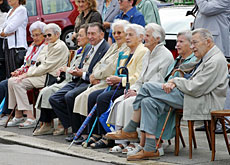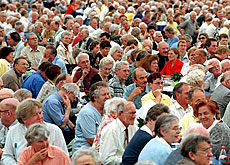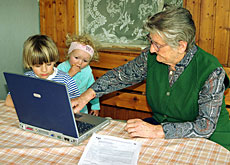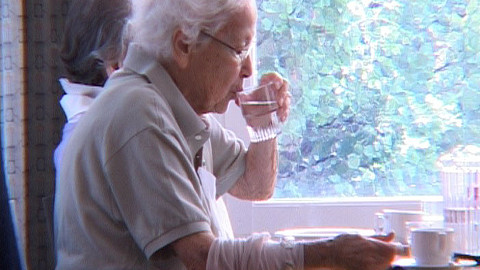Elderly people neglect their health

A high percentage of the over-65s who live at home are not looking after their health properly, according to a Swiss study.
The Swiss Health Observatory published a report on Friday accusing elderly people of failing to take preventive measures to ensure they stay in good shape.
According to the Federal Statistics Office, by 2050 the number of people over 80 is expected to double. The Swiss Health Observatory is therefore keen to “increase the number of years of good health” and to slow the “expected increase in dependent old people”.
The study carried out among 3,700 people over 65 found that 47 per cent did not vaccinate themselves against flu. This figure rose to 90 per cent for bacterial pneumonia.
A fifth of the 65- to 75-year-olds have not had their cholesterol checked during the past five years and a third of those questioned have not had their eyes or ears examined, the report revealed.
According to the authors, this kind of neglect is particularly noticeable among those who are in relatively good health.
Negligent
The report also found that many of those interviewed had high-fat diets low in fibre. Alcohol and tobacco also presented health problems, especially for the men, and women didn’t get enough exercise.
Those who lived on their own with little social contact were found to be particularly inactive and were less inclined to want to vary their diet, thus increasing health risks.
Katherina Meyer, from the Swiss Health Observatory, said elderly people who prefer to live at home were particularly neglectful of their health.
As a result, a great deal can still be done in Switzerland in terms of prevention and health promotion among this group. Much better targeting, taking into account individual situations, would lead to the elderly developing a better attitude about health matters.
Andreas Stuck, professor of geriatric medicine at Bern University and co-author of the study, said the heterogeneous nature of this target group meant that any prevention work must be adapted to all areas of their life.
He added that the most effective programmes were those involving both the elderly patient and their doctor.
swissinfo with agencies
The Swiss population is expected to peak at 8.2 million in 2036 before falling to 8.1 in 2050.
The number of people aged 65 and over will increase by 90% in the same period to 2.2 million people – or 27% of the population.
The Swiss trends mirror those in the European Union where the number of people aged 60 or over is expected to constitute a third of Europe’s population by 2050.
In 2005 average life expectancy in Switzerland for men was 78.7 years and 83.9 years for women – slightly up on previous years.
The Swiss birth rate in 2005 was 9.77 per 1,000 population – down from 10.4 in 2000.

In compliance with the JTI standards
More: SWI swissinfo.ch certified by the Journalism Trust Initiative




You can find an overview of ongoing debates with our journalists here . Please join us!
If you want to start a conversation about a topic raised in this article or want to report factual errors, email us at english@swissinfo.ch.